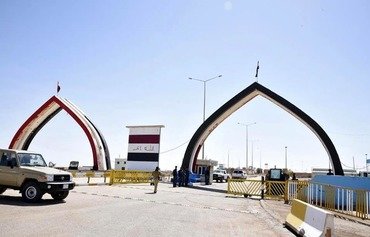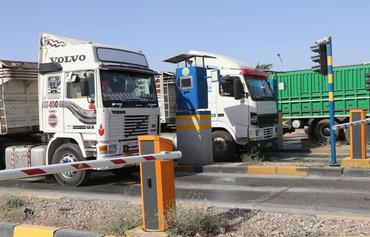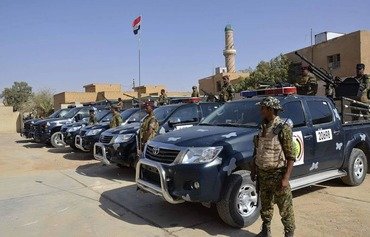With the "Islamic State of Iraq and the Levant" (ISIL) recently losing the Anbar town of Rutbah to Iraqi forces, the group has lost with it access to the international road leading to a key crossing on the Jordan border, officials told Mawtani.
This defeat will cost ISIL millions of dollars in monthly revenue, they said.
In mid-May, the Iraqi army, backed by local fighters, drove out ISIL militants and regained control of Rutbah, located on the road to the Trebil crossing.
ISIL had overran the town and other border areas in western Anbar almost two years ago.
Rutbah's strategic location on the international road that connects Iraq's western borders with the rest of the country, provided ISIL with an important economic resource during the last two years, Anbar provincial council member Jassem al-Halbousi told Mawtani.
"ISIL used to collect tributes from trucks and cars carrying goods across the international road before allowing them to cross into other cities in the country," he said.
Tributes shore up ISIL's coffers
Tributes were collected from everyone without exception, even from small cars, he said, "which provided the group with huge sums of money he was not able to collect from any other international road under its control".
"The collection of tributes was not an arbitrary operation, but followed a systematic approach overseen by special ISIL teams and cells, with all the funds getting funneled to the group's central treasury," said tribal mobilisation leader Sheikh Abdullah al-Jughaifi.
The group collected money from trucks in return for special receipts stamped with the seal of ISIL's "administration" in Rutbah, showing the amount paid, type of truck and nature of cargo, he told Mawtani.
ISIL collected $400 from every truck, he said, adding that "the group has probably made huge amounts of money this way, especially in the months leading up to the liberation of Anbar cities, when the flow of trucks transiting through the international road was continuous".
"This has now drastically changed after Iraqi forces recaptured Rutbah and deployed their security personnel along the international road all the way to the west of Ramadi," he added.
Security gains diminish terrorists' resources
The Iraqi army's recent security gains have dramatically drained ISIL's resources and limited its economic activity, economist Basem Jamil Antoine told Mawtani.
The tributes the group levied "did not have a ceiling but increased depending on many factors, at times reaching $1,000 per truck", he said.
Therefore, losing this income resource compounded ISIL's other recent financial losses, he added, including the oil fields in northern Salaheddine province and the group's oil shipments which were a target of international coalition airstrikes.
The economic noose is tightening around the group's neck, he said, rendering it unable to provide the means necessary for sustaining its combat capabilities on all fronts.
"Retaking the international road leading to the borders has not only put a strain on ISIL's finances, but will also revive trade in Baghdad," he added.
The road leading to the Trebil crossing will facilitate the import and export of goods to and from Baghdad and reduce costs, Antoine said, especially after Iraqi traders were forced to rely on Basra ports as a single outlet for their goods.

![Iraqi military units were deployed along the road from Rutbah all the way to the Trebil crossing after the town was retaken from the 'Islamic State of Iraq and the Levant' in mid-May. [Photo courtesy of the Iraqi joint operations command]](/cnmi_di/images/2016/06/13/5575-Iraq-Trebil-forces-600_384.jpg)






